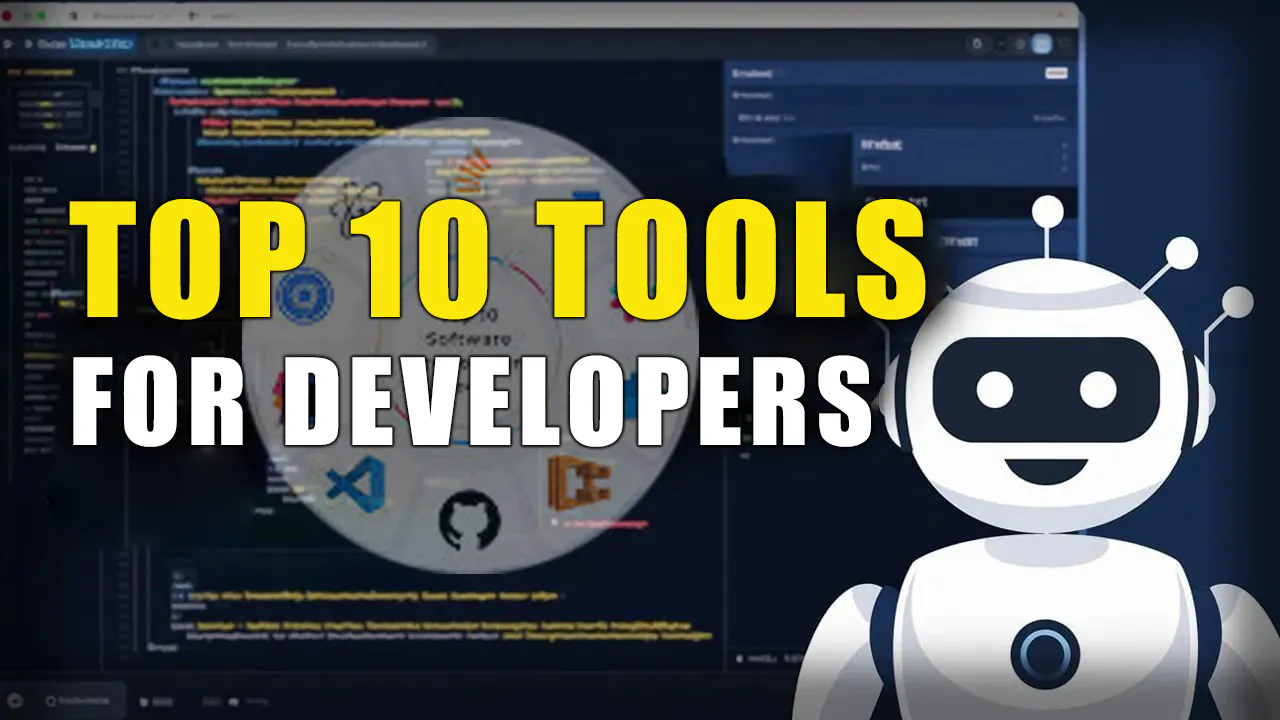Introduction
In this tech era, developers have access to a wide range of tools that simplify coding, collaboration, debugging, and deployment. Here’s a list of the top 10 developer tools for Enhanced Productivity that can enhance productivity, helping you code smarter and faster.
1. GitHub Copilot – The AI Coding Assistant
GitHub Copilot, powered by OpenAI, has become one of the most essential tool among the top 10 developer tools for developers. This AI assistant suggests code snippets and even entire functions, helping developers write code faster and with fewer errors. Integrated directly into Visual Studio Code, Copilot is ideal for reducing repetitive coding tasks and enhancing creativity.
Why Use It?
- Automates routine coding
- Improves code quality
- Reduces time spent on repetitive tasks
2. Visual Studio Code (VS Code) – The Lightweight Code Editor
VS Code remains one of the most popular code editors in 2024. It’s fast, lightweight, and offers numerous extensions for various programming languages. From syntax highlighting to debugging, VS Code has features that make coding smooth and efficient.
Why Use It?
- Supports multiple programming languages
- Integrates with GitHub and Docker
- Highly customizable with extensions
3. Docker – Simplified Application Deployment
Docker continues to lead the way in containerization, enabling developers to package applications with their dependencies. This makes deployment easy and consistent across different environments, making Docker essential for DevOps workflows.
Why Use It?
- Ensures consistency across development and production environments
- Simplifies application scaling and deployment
- Reduces compatibility issues
4. Jira – Project Management for Agile Teams
Jira is a powerful tool for managing projects, particularly for agile teams. It helps track tasks, bugs, and feature requests, keeping the entire team aligned on project goals and progress.
Why Use It?
- Customizable workflows for different teams
- Great for tracking tasks, sprints, and backlogs
- Integrates with development tools like GitHub and Slack
5. Postman – API Development Simplified
Postman remains the go-to tool for API testing and debugging. With its easy-to-use interface, developers can test API endpoints, set up automated tests, and generate documentation with ease.
Why Use It?
- Simple interface for API testing
- Supports automated testing and scripting
- Easily shares requests and collections with team members
6. Notion – Organize Ideas and Document Code
Notion is a versatile tool for managing documents, taking notes, and organizing ideas. It’s particularly useful for developers who want to keep track of project notes, store snippets, and manage tasks in one place.
Why Use It?
- Flexible workspace for documentation and task tracking
- Supports embedding code snippets
- Great for team collaboration and knowledge sharing
7. Kubernetes – For Orchestrating Containers
Kubernetes, an open-source platform, has become a must-have for managing containers in complex applications. It automates deployment, scaling, and operation of application containers, especially for applications running in the cloud.
Why Use It?
- Simplifies container orchestration at scale
- Enhances app reliability and availability
- Allows for easy scaling of applications
8. Figma – Collaborative Design Tool
Figma is a design and prototyping tool widely used by developers and designers. It allows for real-time collaboration, making it easy for teams to work together on UI/UX design projects. Figma’s simplicity and collaborative features make it a preferred choice over traditional design tools.
Why Use It?
- Real-time collaboration for teams
- Supports UI design, prototyping, and feedback
- Accessible from any browser without software installation
9. Slack – Communication Simplified
Slack is a team communication tool that keeps developers connected. Its channels, direct messaging, and integration with tools like GitHub and Jira make it perfect for keeping everyone updated without overwhelming email chains.
Why Use It?
- Channels keep conversations organized
- Integrates with development tools like GitHub and Jenkins
- Supports file sharing and quick notifications
10. Terraform – Infrastructure as Code (IaC)
Terraform by HashiCorp is the go-to tool for developers managing cloud infrastructure. It allows for Infrastructure as Code, helping developers to provision and manage resources like servers, storage, and networking in a controlled and scalable way.
Why Use It?
- Automates cloud infrastructure management
- Supports multiple cloud platforms (AWS, Azure, Google Cloud)
- Enables version control for infrastructure configurations
Final Thoughts
These top 10 developer tools make life easier for developers by streamlining coding, testing, deployment, and collaboration. Using these top tools can enhance productivity, improve code quality, and ultimately, help you build better software faster. Embrace these tools, and your development process will become more efficient and enjoyable.
Which tool do you find most helpful? Let us know in the comments! Visit us for more to know about us

Leave a Reply